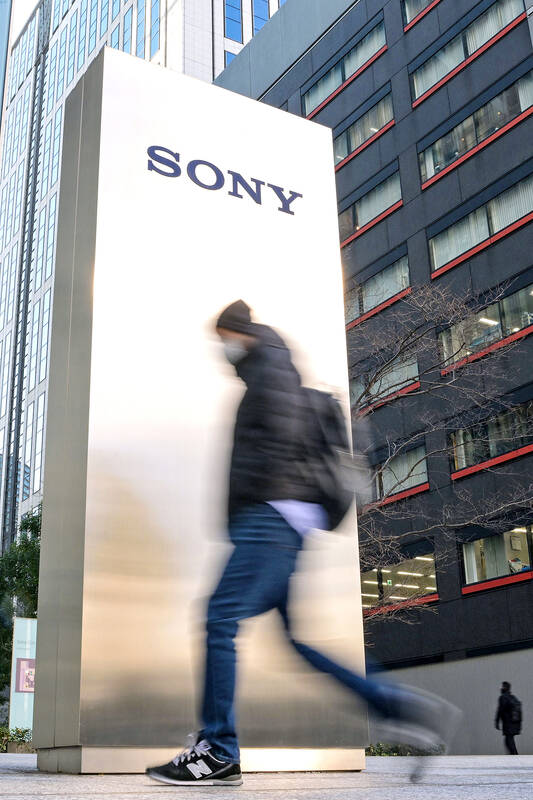Sony Group Corp said it is to list its financial arm in October next year, preparing for a major capital infusion after the media conglomerate cut the forecast for its core gaming division.
The company revealed plans for the partial sale after reporting earnings and revising its forecasts for the fiscal year through next month. The move to take Sony’s financial group public is to reverse a US$3.7 billion take-private deal concluded in 2020.
Sony trimmed its revenue forecast after sales of its flagship PlayStation 5 (PS5) came in roughly 1 million units lower than projected in the fourth quarter of last year, at 8.2 million consoles. The company also said it expects to sell 21 million units for the fiscal year, down from the previous forecast for 25 million units.

Photo: AFP
“Looking ahead, PS5 will enter the latter stage of its life cycle,” Sony senior vice president Naomi Matsuoka said. “As such, we will put more emphasis on the balance between profitability and sales. For this reason, we expect the annual sales pace of PS5 hardware will start falling from the next fiscal year.”
The Japanese firm now expects ¥12.3 trillion (US$81.7 billion) in sales for the year, down from ¥12.4 trillion previously. It reported revenue of ¥3.75 trillion and operating profit of ¥463.3 billion in the quarter ended December, in line with average analyst estimates.
“The result showed Sony spent a lot on promotions to sell the PS5, as the unit’s profitability deteriorated, but the number of units it shipped during the quarter was much weaker than expected,” Morningstar research director Kazunori Ito said.
The disappointing hardware sales came despite a strong quarter for software. Released in October last year as a PS5 exclusive, Marvel’s Spider-Man 2 sold 2.5 million copies in its first 24 hours, making it the fastest-selling debut from Sony’s in-house studios. It lifted expectations, along with Sony’s record number of users on the PlayStation network in December, that the PS5 was gaining momentum after years of limited supply.
Analysts remain cautious about Sony’s goal of selling more than 25 million PS5 units this fiscal year. The company released an updated edition of the hardware in October, making it more compact and power-efficient.
Key for the revenue-driving games division is sustaining momentum for the US$499 machine. On the market since late 2020, the PS5 has had a difficult time reaching Sony’s audience as production issues and COVID-19 pandemic-related shipping bottlenecks limited its supply for years.
Rivals Nintendo Co and Microsoft Corp are expected to release new hardware in time for the holiday season, raising the level of competition.
Sony might need to reshape its strategy in India, after a planned merger between its India unit and local media outfit Zee Entertainment Enterprises Ltd reached an impasse due to disagreement over leadership. The Zee deal was the centerpiece to the Japanese firm’s increased push into a market of 1.4 billion people, and investors would look for indications of Sony’s latest thinking on the matter.

Taiwan Semiconductor Manufacturing Co (TSMC, 台積電) last week recorded an increase in the number of shareholders to the highest in almost eight months, despite its share price falling 3.38 percent from the previous week, Taiwan Stock Exchange data released on Saturday showed. As of Friday, TSMC had 1.88 million shareholders, the most since the week of April 25 and an increase of 31,870 from the previous week, the data showed. The number of shareholders jumped despite a drop of NT$50 (US$1.59), or 3.38 percent, in TSMC’s share price from a week earlier to NT$1,430, as investors took profits from their earlier gains

In a high-security Shenzhen laboratory, Chinese scientists have built what Washington has spent years trying to prevent: a prototype of a machine capable of producing the cutting-edge semiconductor chips that power artificial intelligence (AI), smartphones and weapons central to Western military dominance, Reuters has learned. Completed early this year and undergoing testing, the prototype fills nearly an entire factory floor. It was built by a team of former engineers from Dutch semiconductor giant ASML who reverse-engineered the company’s extreme ultraviolet lithography (EUV) machines, according to two people with knowledge of the project. EUV machines sit at the heart of a technological Cold

Taiwan’s long-term economic competitiveness will hinge not only on national champions like Taiwan Semiconductor Manufacturing Co. (TSMC, 台積電) but also on the widespread adoption of artificial intelligence (AI) and other emerging technologies, a US-based scholar has said. At a lecture in Taipei on Tuesday, Jeffrey Ding, assistant professor of political science at the George Washington University and author of "Technology and the Rise of Great Powers," argued that historical experience shows that general-purpose technologies (GPTs) — such as electricity, computers and now AI — shape long-term economic advantages through their diffusion across the broader economy. "What really matters is not who pioneers

TAIWAN VALUE CHAIN: Foxtron is to fully own Luxgen following the transaction and it plans to launch a new electric model, the Foxtron Bria, in Taiwan next year Yulon Motor Co (裕隆汽車) yesterday said that its board of directors approved the disposal of its electric vehicle (EV) unit, Luxgen Motor Co (納智捷汽車), to Foxtron Vehicle Technologies Co (鴻華先進) for NT$787.6 million (US$24.98 million). Foxtron, a half-half joint venture between Yulon affiliate Hua-Chuang Automobile Information Technical Center Co (華創車電) and Hon Hai Precision Industry Co (鴻海精密), expects to wrap up the deal in the first quarter of next year. Foxtron would fully own Luxgen following the transaction, including five car distributing companies, outlets and all employees. The deal is subject to the approval of the Fair Trade Commission, Foxtron said. “Foxtron will be